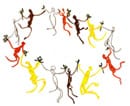In the PACA region, it is the APPASCAM association that is pioneering by being the first training center authorized to provide this training, eventually leading to a real Certificate and an internship either in its own association or in one of the project’s partner associations.
To learn more about this certificate, Nice Premium met with Nathalie Audin, Director of APPASCAM, who tells us more about the arrival of this newcomer in the Azuréenne associative life.
Interview with Nathalie AUDIN
Director of APPASCAM
Nice Premium: Nathalie Audin, what is the Certificate of Training in Associative Management?
Nathalie Audin: The associative management certificate is aimed at leaders, volunteers, members, and employees of associations who would like to acquire knowledge in the management of associations.
It is a training of sixty-six theoretical hours and twenty practical hours.
The theoretical training is provided by APPASCAM in partnership with KOMUNIKOM, and the practical training can be done at the trainee’s original association, or upon request, at another volunteering association.
Throughout the training, a logbook will follow the evolution and the knowledge acquired, and at the end of the training, a certificate will validate the completion of the training.
This training is accredited by the Ministry of Health, Youth, and Sports.
NP: What will we learn during this training?
NA: Six modules ranging from 9 to 15 hours are offered, the trainee must validate all the modules as well as the 20-hour practical internship to obtain their certificate. The modules are as follows:
• Fundamental principles of the law of 1st July 1901
• Evolution of the associative world and its institutional environment
• Statutory bodies of an association
• Basics of financial management of an association
• From the associative project to activity projects and organization of events
• Different stakeholders of the associative project (leaders, volunteers, employees, users) and their relations
NP: What will the certificate obtained at the end of the training serve for?
NA: At the end of the training, the trainee will have received training allowing them to grasp the sometimes more complex realities of managing an association. With their certificate in hand, they will notably better understand the socio-economic challenges and will have more credibility with partners, whether public (State, local authorities, public institutions) or private (sponsorship, patronage).
NP: In the future, could this certificate be required by administrations for obtaining subsidies?
NA: Public partners need to ensure good management of public money. Obtaining this certificate simply provides information that the leader in question has undergone at least some training in associative management.
Fortunately, there is no particular obligation concerning volunteers. Volunteers already give enough of their time and sometimes their money so that public partners do not have too excessive demands.
As part of validating experience, obtaining this certificate will allow the volunteer to add an additional element to their VAE (Validation of Acquired Experience) file.
NP: Is the CFGA the right solution for training the association leaders and executives of tomorrow?
NA: Definitely, I think especially of the youth who must also be aware that an association is not just a place of consumption but requires rigorous management. Current leaders sometimes panic faced with difficulties in renewing volunteerism, perhaps it would simply be enough to give young people a taste for associative management. The CFGA could be a solution.
The CFGA is open to young people from the age of 16 onwards.
NP: What is the cost of this training and are there possibilities for funding?
NA: The training costs €450 (with possibilities of a lower cost depending on the means that would be made available to the trainer). The aim is to adapt as much as possible according to everyone’s possibilities.
When these trainings are organized at the headquarters of APPASCAM, they take place on Friday evenings from 6pm to 9pm and Saturdays from 9:00 am to 4:00 pm to best match the schedules of volunteers.
A first session is organized from April 10, 2009 in the premises of APPASCAM.
When they are organized in other venues (association houses, city halls, etc.), we adapt to the means provided.
Employer associations can contact their authorized joint agency (OPCA) for funding as part of volunteer training. There is also funding available within the framework of the CTVA (Council for the Development of Associative Life), applications should be made to the Departmental Directorate of Youth and Sports (Tel. 04 93 19 40 00) to Mrs. DELFINO-PARODI.
NP: Finally, I am an Azuréenne association and I want to pass the CGA, how should I go about it?
NA: Simply by contacting APPASCAM. We will inform you of the session dates, administrative formalities, and possible fundings available.
Contact Mr. Benoît GIRAUD or Mrs. Véronique PECHENET


